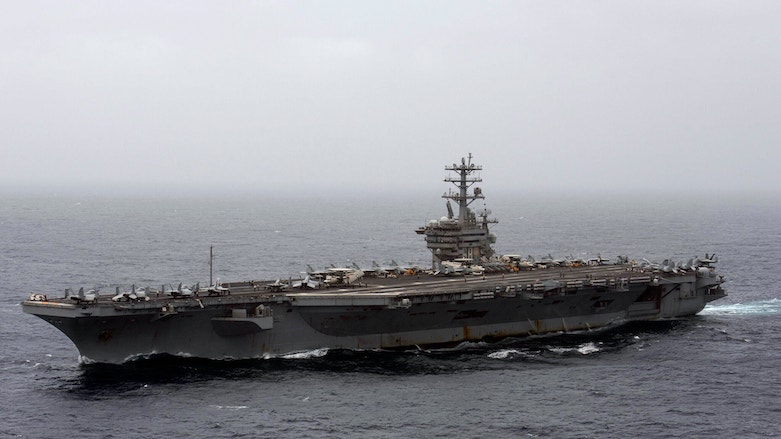Pentagon reverses stand on aircraft carrier: ordered to remain in Middle East

WASHINGTON DC (Kurdistan 24) – On Sunday evening, on the first anniversary of the Jan. 3 US assassination of the head of the Quds Force of Iran’s Islamic Revolutionary Guard Corps, Gen. Qasim Soleimani, the Pentagon released a statement in the name of Acting Secretary of Defense, Christopher Miller.
The statement explained that the aircraft carrier, the USS Nimitz, would remain in the Middle East.
The day before, the US media, including The New York Times, had reported that Miller had ordered the Nimitz to return to the US “over the objections of top military advisers.”
Officials told the Times that Miller had ordered the ship’s return to the US “in part as a ‘de-escalatory’ signal to Tehran to avoid stumbling into a crisis in President Trump’s waning days in office.”
The Nimitz’ return contradicted other signals that Washington had been sending to Iran—messages of deterrence and resolve, as the anniversary of Soleimani’s assassination approached.
Read More: US warns Iran with B-52 bomber flight, submarine deployment
If the Pentagon leadership thought its gesture of bringing the aircraft carrier back home would be appreciated in Tehran, they quickly learned otherwise.
On the night of Jan. 2 and the next day, thousands of people gathered in central Baghdad to protest the US military presence in Iraq and remember Soleimani and Abu Mahdi al-Muhandis, head of the Popular Mobilization Forces, who was traveling in Soleimani’s vehicle when it was struck by a US missile.
“Due to the recent threats issued by Iranian leaders against President Trump and other US government officials, I have ordered the USS Nimitz to halt” what Miller described as “its routine redeployment.”
“The USS Nimitz will now remain on station in the US Central Command area of operations,” Miller’s Sunday night statement continued. “No one should doubt the resolve of the United States of America.”
Why can’t US officials learn from history?
Miller became Acting Secretary of Defense in November, when Trump fired Mark Esper, soon after the 2020 presidential elections. It is unclear why Esper was dismissed; perhaps, he opposed Trump’s plans to radically reduce the number of US troops in Afghanistan.
Miller had served in the US Army’s Special Forces in both Iraq and Afghanistan, and then as a counter-terrorism advisor on Trump’s National Security Council, before he held, very briefly, a series of positions: Acting Assistant Secretary of Defense for Special Operations and Low-Intensity Conflict (June-August 2020); Director of the National Counterterrorism Center (August-November 2020), after which he became Acting Secretary of Defense.
Why Miller or anyone else in the Pentagon’s leadership might have thought a conciliatory gesture toward Iran would be reciprocated is difficult to understand. Past experience suggests the opposite.
The Iranian revolution occurred when Jimmy Carter was US president. A decent man, Carter was elected in the wake of the Watergate scandal and Richard Nixon’s resignation. But Carter was weak in the face of foreign aggression and was voted out of office, after only one term.
In November 1979, Iran seized the US embassy and held its diplomats hostage until January 1981, when Ronald Reagan became president. Iran’s new revolutionary government sought to humiliate the US—and benefited from doing so, as that strengthened the more radical elements.
Reagan took a much tougher line toward Iran than Carter. The Iranians did not want to deal with Reagan, but still wanted to humiliate Carter. They released the hostages after protracted negotiations conducted with the Carter administration—but not while Carter was president. They waited until after Reagan took office and released the hostages later that same day.
A lesson should have been learned: Tehran responds to pressure, not to conciliatory US gestures. In the face of what it regards as a serious US threat, it avoids provoking Washington.
A similar point was demonstrated four years later, as Israel persuaded the US to deliver arms to Iranian “moderates” to help Tehran in its war with Iraq.
Iran had been Israel’s most important Middle East ally before the revolution, and Israel hoped to restore those relations.
Among those involved in the effort was the late Uri Lubrani, Israel’s ambassador to Iran at the time of the revolution and a frequent visitor to Washington. In speaking with The Washington Post then, Lubrani was critical of what he described as a US failure to recognize “the importance of Iran.”
Lubrani spoke as if being of assistance to Tehran would be reciprocated. But it was not—not for Israel, which sold arms to Iran for many years, but remained the “Little Satan” and not for the US, the “Great Satan,” which sold arms to Iran for two years.
From 1985 to 1987, the Reagan administration provided Tehran with military equipment. It became known as the Iran-contra scandal, because the US officials involved used the money that Iran paid for the US arms to fund the Nicaraguan opposition—the contras, although Congress had prohibited such support.
Of course, the arms sales did not affect at all the position of Tehran—which remained hostile to both Israel and the US. Subsequently, in the 1990s, the Israelis, including Lubrani, came around to this very view and repeatedly pressed the opposite perspective, as they lobbied for US action against Iran.
Indeed, as one senior Pentagon official told this reporter, even as the George W. Bush administration had decided to oust Saddam Hussein in the wake of the 9/11 attacks and was actually preparing to do so, the Israelis pressed Washington to take action against Iran instead.
Editing by Karzan Sulaivany
